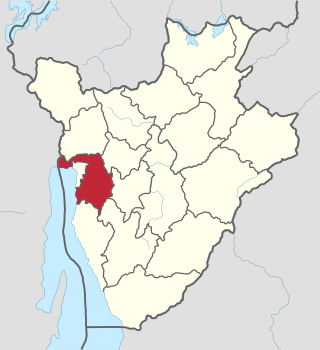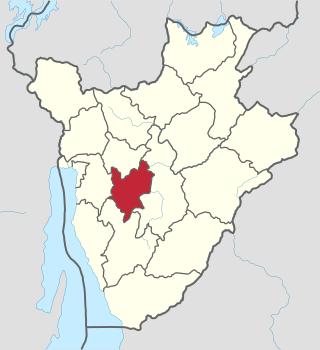Gisozi Kisozi | |
|---|---|
| Coordinates: 3°34′S29°41′E / 3.567°S 29.683°E | |
| Country | |
| Province | Mwaro Province |
Gisozi, also Kisozi is a settlement in central Burundi and capital of the commune of the same name.
Gisozi Kisozi | |
|---|---|
| Coordinates: 3°34′S29°41′E / 3.567°S 29.683°E | |
| Country | |
| Province | Mwaro Province |
Gisozi, also Kisozi is a settlement in central Burundi and capital of the commune of the same name.
Gisozi is in Mwaro Province, to the southeast of Bujumbura (the largest city and former capital of Burundi) and southwest of Gitega (the current capital). [1] It is on the RP33 road, which runs north from the RN7 highway through Gisozi to the town of Mwaro. There is a health center in the southwest of the village. [2]
The first tea cultivation trials in Burundi were set up at the Gisozi Agronomic Research Station (Recherche Agronomique de Gisozi) in 1963. [3] This is a regional branch on the Institute of Agronomic Sciences of Burundi (ISABU). [4]
In March 1999 the Italian Cooperation Office donated a 3"x3" water motor pump and a 4.5KVA/50hz generator set to the research station. [5] In June 2017 the station was receiving technical and financial support from the International Atomic Energy Agency (IAEA) in research into using nuclear techniques to boost the productivity of cassava, an important basic food in Burundi. [4]

Bujumbura, formerly Usumbura, is the economic capital, largest city and main port of Burundi. It ships most of the country's chief export, coffee, as well as cotton and tin ore. Bujumbura was formerly the country's political capital. In late December 2018, Burundian president Pierre Nkurunziza announced that he would follow through on a 2007 promise to return Gitega its former political capital status, with Bujumbura remaining as economical capital and center of commerce. A vote in the Parliament of Burundi made the change official on 16 January 2019, with all branches of government expected to move to Gitega within three years.

Bujumbura Rural Province is one of the eighteen provinces of Burundi. Former President Cyprien Ntaryamira was born here. It surrounds the former national capital Bujumbura and its provincial capital is Isale.

Bururi Province is one of the eighteen provinces of Burundi. It was formerly Burundi's largest province until the communes of Burambi, Buyengero and Rumonge were transferred to the province of Rumonge when it was created in 2015.

Gitega, formerly Kitega, is the political capital of Burundi. Located in the centre of the country, in the Burundian central plateau roughly 62 kilometres (39 mi) east of Bujumbura, the largest city and former political capital, Gitega is the country's fourth largest city and former royal capital of the Kingdom of Burundi until its abolition in 1966. In late December 2018, Burundian president Pierre Nkurunziza announced that he would follow on a 2007 promise to return Gitega its former political capital status, with Bujumbura remaining as economic capital and centre of commerce. A vote in the Parliament of Burundi made the change official on 16 January 2019, with all branches of government expected to move in over three years.

Mwaro Province is one of the 19 provinces of Burundi. Its capital is Mwaro.

Burundi, officially the Republic of Burundi, is a landlocked country in the Great Rift Valley at the junction between the African Great Lakes region and Southeast Africa, with population of over 14 million people. It is bordered by Rwanda to the north, Tanzania to the east and southeast, and the Democratic Republic of the Congo to the west; Lake Tanganyika lies along its southwestern border. The capital city is Gitega and the largest city is Bujumbura.

On 25 April 2015, the ruling political party in Burundi, the National Council for the Defense of Democracy – Forces for the Defense of Democracy (CNDD-FDD), announced that the incumbent President of Burundi, Pierre Nkurunziza, would run for a third term in the 2015 presidential election. The announcement sparked protests by those opposed to Nkurunziza seeking a third term in office.
The following is a timeline of the history of the city of Bujumbura, Burundi.

The University of Ngozi (UNG), also Ngozi University, is a private university in Burundi. It was established on 17 April 1999 by the Constituent Assembly and was approved by Ministerial Ordinance No. 530/264 on 7 May 1999.
Jean-Marie Muhirwa is a politician who was elected senator for Kirundo Province, Burundi in 2015. He resigned in 2016 to become a member of the East African Legislative Assembly (EALA).

The Natural regions of Burundi are geographical subdivisions of Burundi that date to colonial times. They can be broadly grouped into the Plain zone in the west beside Lake Tanganyika and the East African Rift valley, the Congo-Nile ridge, the Central Plateaus and the Depressions to the north, east and south of the plateaus.
The University of Mwaro is a private university in the Commune of Kayokwe, Mwaro Province, Burundi.

REGIDESO Burundi is a state-owned water and power distribution company in Burundi.
The Mugere River is a river in Bujumbura Rural Province, Burundi.
The Kaniga River is a river in Burundi.
The Burundi Coffee Board, or Office du Café de Burundi, was a coffee industry agency in Burundi, since replaced by ARFIC;.

The Burundi Tea Office, or OTB, is a public company that supports the tea industry in Burundi.
The Imbo Regional Development Company, or SRDI, is a public company that sponsors rural development in the Imbo natural region of northwest Burundi.
The Public Real Estate Company, or SIP, was a state-owned company that developed serviced plots and built housing for civil servants and managers in Burundi.
The Veterinary Pharmaceutical Office, or OPHAVET, was a state-owned company that distributed vetinerary products in Burundi.